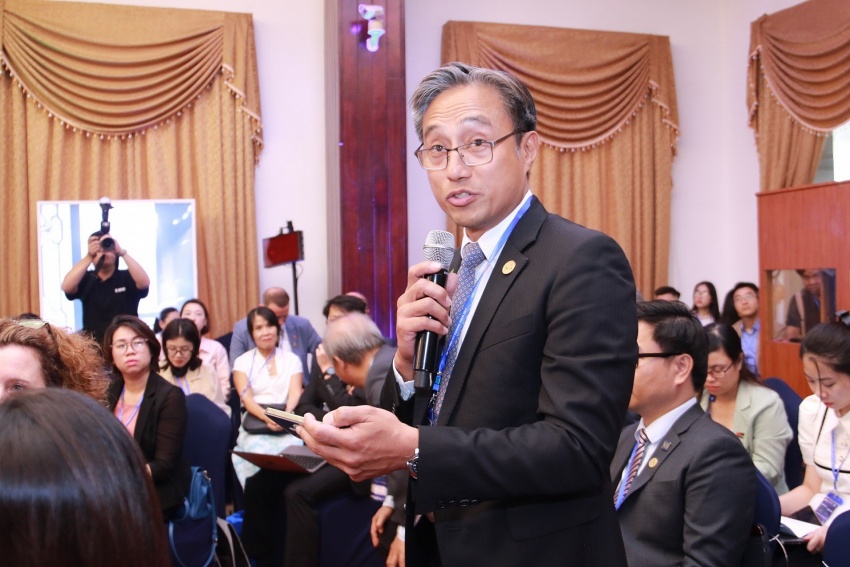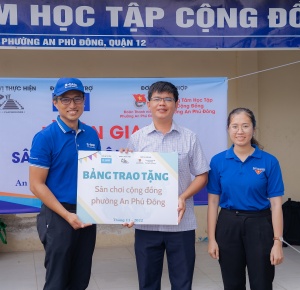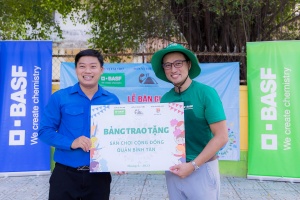BASF Vietnam targets sustainability of its value chain
What role do focal companies play in affecting suppliers and customers by implementing circular economy practices in their business activities?
 |
| Erick Contreras, managing director, BASF Vietnam. |
BASF is a leading chemical company headquartered in Germany, and we produce and supply chemical products as raw materials to almost all industries.
For this reason, our products are essential components in the value chain and the sustainability of our solutions serves as a critical driver for the sustainability of the whole system.
BASF has been dedicated to sustainability for over 30 years. In our commitment to become net-zero by 2050, we are not only focused on managing carbon emissions within Scope 1 – our own emissions at BASF’s sites – and Scope 2 – emissions from the energy that BASF is buying – but also addressing the emissions within Scope 3 – emissions originating from the raw materials we procure, which significantly contribute to the Product Carbon Footprint (PCF) of our final products.
To address this, we actively ascertain the PCF of our raw materials and engage with our suppliers by sharing our knowledge of PCF valuation and calculation methods.
Since 2021, we have initiated discussions with more than 1,300 suppliers, representing around 60 per cent of our raw materials-related greenhouse gas (GHG) emissions.
Next, we are committed to working collaboratively with our suppliers to identify and implement solutions aimed at reducing product-related emissions. Our goal is to establish the Product Carbon Footprint as a criterion for our purchasing decisions.
Furthermore, we acknowledge the significance of logistics in this equation. It's heartening to see an increasing number of logistics companies in Vietnam adopting low-emission solutions and services, which can greatly support our sustainability goals.
We also actively engage and collaborate with our customers.
Our ongoing research and development efforts are dedicated to creating innovative products that empower our customers to adopt more sustainable practices. For example, projects using bio-based, recycle-enabling, and chem-cycled materials.
Moreover, as material suppliers, we provide transparency by offering Product Carbon Footprint information for our extensive portfolio of over 45,000 products. This empowers our customers – for example, those exporting into EU markets with stringent standards on CO2 footprints and sustainability – with insights into the GHG emissions associated with the raw materials they source from us, facilitating informed and sustainable choices.
In conclusion, the role of focal companies within the supply chain is pivotal. Our commitment to sustainability encompasses our internal emissions and extends to our suppliers and customers. By collaborating with suppliers to reduce emissions and provide transparent information to customers, we aim to jointly drive a more sustainable and circular economy.
How can enterprises promote collaboration with universities and research institutes on circular economy practices? Does BASF Vietnam or BASF Global have current policies and projects working with academia?
Innovation has always been the key to BASF’s success. Annually, we allocate over one-third of our earnings before interest and taxes to innovation, which spans the development of new processes, technologies, and products.
In our research collaborations, we offer scientists from universities and research institutes the opportunity to participate in close-to-practice research projects and thereby create added value for our society by developing innovative solutions. We maintain close relations with many universities and research institutes around the world.
Our Academic Research Alliances focus on research groups from multiple universities with specific research focuses, and thus form a global network of our world-class academic partners. The alliances are complemented by collaborations with around 220 universities and research institutes, as well as a large number of companies.
Regarding our commitment to sustainability and circular economy practices, BASF has set ambitious targets. As previously mentioned, we are resolutely committed to achieving net-zero emissions by 2050. Alongside our financial objectives, we have established non-financial targets that underscore our dedication to sustainable solutions.
BASF Vietnam is actively exploring sustainability projects that necessitate collaboration with local universities and institutions. We recognise the invaluable local expertise present in these institutions, which serves as a considerable advantage in our pursuit of sustainable solutions.
We are excited about the potential for these partnerships to drive innovation and contribute to a more sustainable and circular future, and hope we can share more details in the coming time.
 | BASF Vietnam hands over sixth public playground for children BASF Vietnam handed over a low-carbon playground to the local authorities in Ho Chi Minh City's District 12 on November 3 as a joint effort with the social enterprise Think Playgrounds. |
 | BASF Vietnam: creating chemistry for a sustainable country Chemicals group BASF is driving sustainability through innovations and partnerships across the value chain. |
 | BASF Vietnam and Think Playgrounds launch seventh public playground in Ho Chi Minh City BASF Vietnam and Think Playgrounds have joined forces to inaugurate the seventh public playground in Binh Tan district, marking the commencement of the summer holiday and World Environment Day. |
What the stars mean:
★ Poor ★ ★ Promising ★★★ Good ★★★★ Very good ★★★★★ Exceptional
Related Contents
Latest News
More News
- Bac Ai Pumped Storage Hydropower Plant to enter peak construction phase (January 27, 2026 | 08:00)
- ASEAN could scale up sustainable aviation fuel by 2050 (January 24, 2026 | 10:19)
- 64,000 hectares of sea allocated for offshore wind surveys (January 22, 2026 | 20:23)
- EVN secures financing for Quang Trach II LNG power plant (January 17, 2026 | 15:55)
- PC1 teams up with DENZAI on regional wind projects (January 16, 2026 | 21:18)
- Innovation and ESG practices drive green transition in the digital era (January 16, 2026 | 16:51)
- Bac Ai hydropower works stay on track despite holiday period (January 16, 2026 | 16:19)
- Fugro extends MoU with PTSC G&S to support offshore wind growth (January 14, 2026 | 15:59)
- Pacifico Energy starts commercial operations at Sunpro Wind Farm in Mekong Delta (January 12, 2026 | 14:01)
- Honda launches electric two-wheeler, expands charging infrastructure (January 12, 2026 | 14:00)

 Tag:
Tag:




















 Mobile Version
Mobile Version